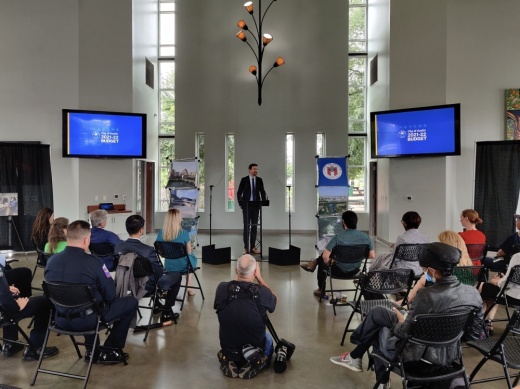Among the items highlighted by Cronk and other officials during the event were public safety and related funding, homelessness, the COVID-19 pandemic, disaster resilience, housing and the city's overall financial outlook.
While Cronk said the city is currently tracking unexpectedly high sales and property tax returns that have set up a "relatively stable" fiscal year ahead, he and several council members in attendance also expressed concern over the effects that a state-imposed limit on cities' yearly property tax revenue increases could have on Austin's budget down the line.
"In the absence of approval to exceed the cap, simply covering the annual increase in our base costs alone ... will require a fundamental change in the way we do business," Cronk said. "Without securing additional revenue and/or dramatically curtailing expenditure growth, we project an ongoing budget imbalance that will grow year after year."
That cap of 3.5% revenue increase could be upped if the issue is put before city voters, who could approve an increase of up to 8% annually, a possibility Cronk said may be considered over the years ahead.
For the fiscal year 2021-22 plan now under consideration, Mayor Steve Adler stressed the importance of Austin's financial performance since last spring as one of his top takeaways while also noting the potential for harder decisions in the future.
"To have emerged from the pandemic able to come up with a balanced budget at the 3.5% point, to lower the city portion of the property tax bill ... the most important thing is to realize that we can do this only because of just how sound fiscally the city is," Adler said. "Obviously there are darker clouds on the horizon, given the state legislature's revenue cap, but this budget contains a lot of the elements that I think are important for us in homelessness and in public safety—and does it with a property tax decrease."
Public safety, including the level of funding the Austin Police Department is to receive, was mentioned by several council members as another key piece of the overall framework. Cronk said the city will move to comply with House Bill 1900, passed this spring to penalize any cities deemed at the state level to have "defunded" their police departments, meaning that tens of millions of dollars shifted away from APD last year.
Mayor Pro Tem Natasha Harper-Madison said she was "shocked" the city is in the financial shape it is now given the fallout from the pandemic, but shared concerns for the future and the "tightening up" Austin will likely move through. She also pointed to the expanded police budget as an item that may be out of proportion with the city's needs.
“I think any municipality who spends 70% of their annual budget on public safety is probably doing something wrong. But that said, there’s nothing we can do about it now," she said. "I just look forward to us in the future really thinking about the best way to apply our limited resources."
District 6 Council Member Mackenzie Kelly earlier this week shared her budget priorities, including allocations for new police cadet classes and overall resources within the department. With a potential operating budget of $442.81 million for the coming fiscal year—a nearly 43% jump from where the department's budget ended up last year, and a 2.44% increase from fiscal year 2019-20's final total—Kelly said she was pleased with where the initial proposal ended up.
“I think this is a great starting point. I’m excited to see that we are going to re-fund the police department because of HB 1900, and I’m looking forward to finding that happy medium among my colleagues to ensure that we do get adequate improvements to police cadet classes," she said.
District 4 Council Member Greg Casar said he was disappointed with the city's need to readjust on both financial and public safety fronts due to state influence. He also expressed optimism that some of the city's approaches to rethinking public safety services initiated in 2020 will continue to grow regardless of policing-specific funding requirements.
“We are going to have to address those deficits that are also caused by those misguided laws from the state, but we’ll just keep on being Austin and doing the best we can by our people," Casar said. “I think what’s important is that our Reimagining Public Safety work and civil rights work and reform work is on track, but there have been unfortunate consequences from the state law that are trying to push us to not follow best scientific practice for our forensics labs. And that’s really frustrating, but we will fight on and find a way to fix it if we can.”
District 2 Council Member Vanessa Fuentes said her top takeaways from Cronk's overview came from the approach to disaster response and resident displacement, two of the budgetary priorities she had shared with her colleagues on the dais earlier this month.
“I really appreciate the theme around resilience. ... [District 2 is] a community that has gone through two catastrophic floods, and so part of my priorities include ensuring that we’re being very mindful about improving our flood resilience, and also food access," Fuentes said. “I really want to see more investment in displacement prevention. ... We’re a growing city so we have to make sure that we’re being mindful of how our families are able to still live and thrive in Austin. And having a really good check on affordability, and doing even more on that front."
More information on Austin's proposed fiscal year 2021-22 budget may be viewed here. The city plans to hold resident meetings on the plan July 22 and 29, and City Council will continue to adjust the document until its final approval mid-August.





